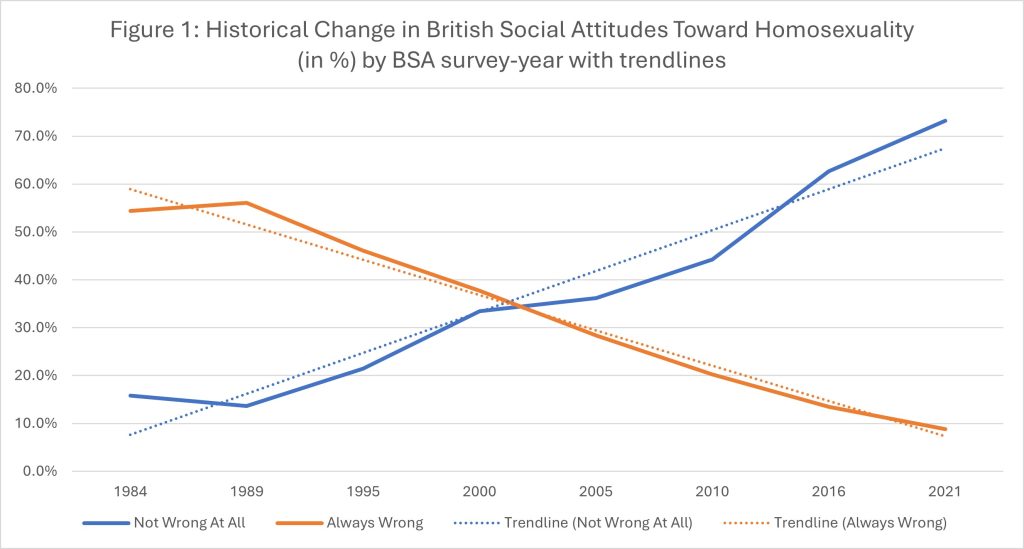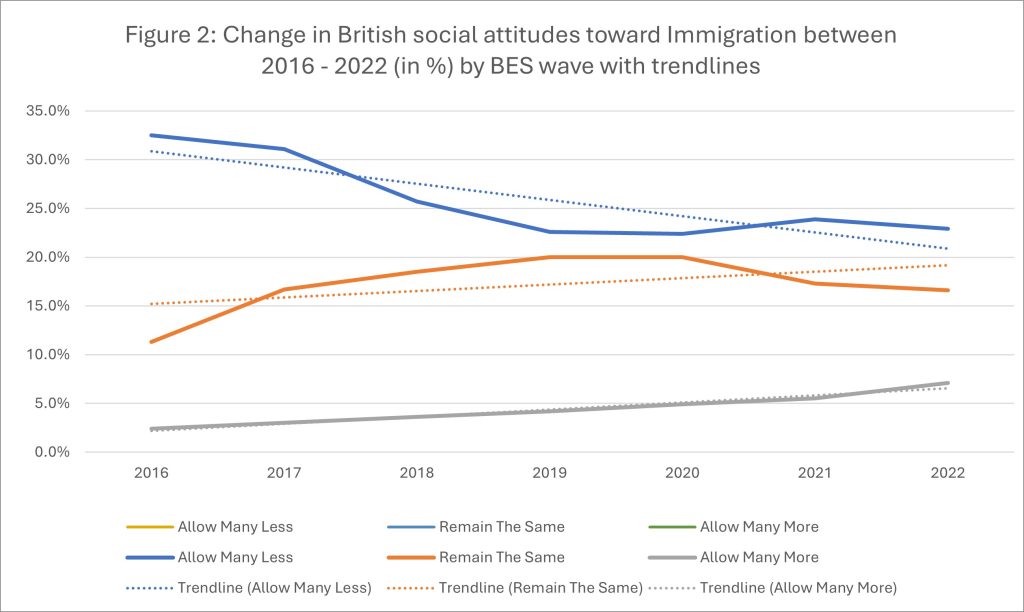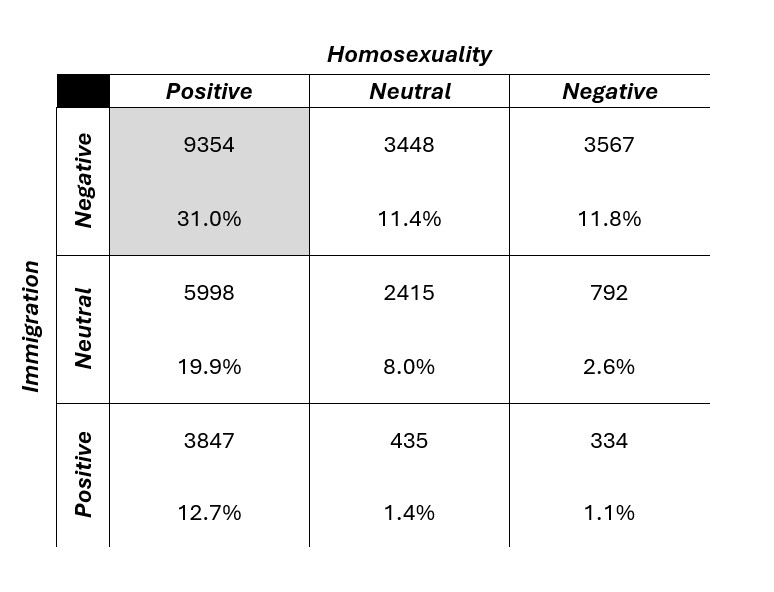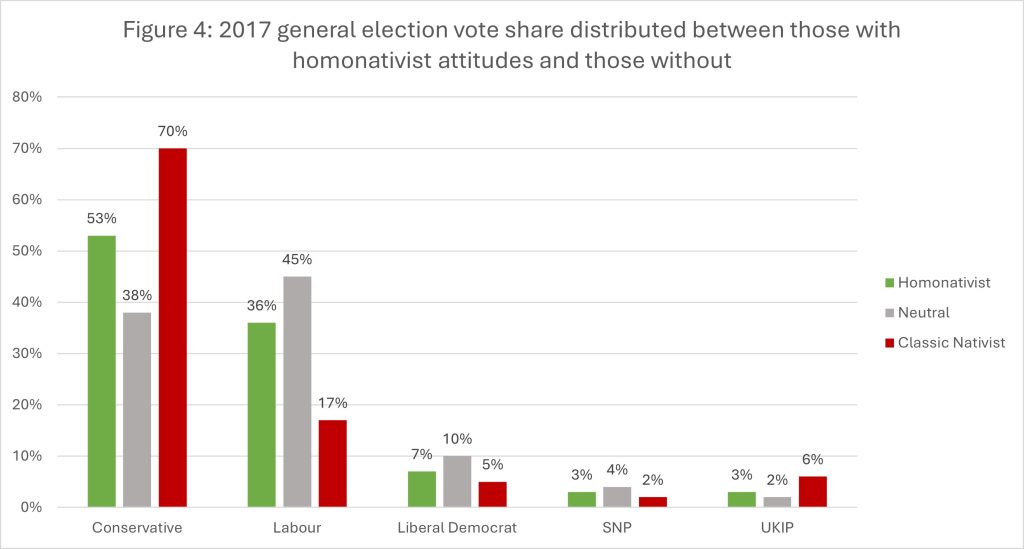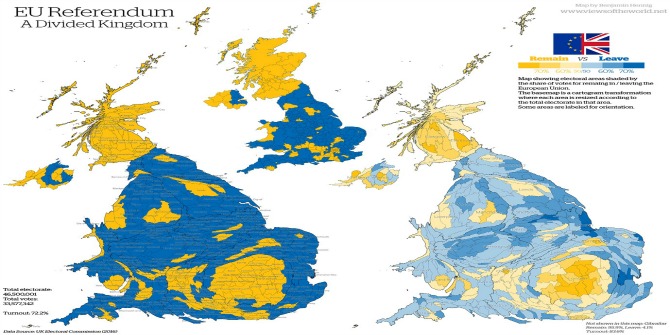In the past one would expect to find progressive views on homosexuality would be a predictor of progressive attitudes in other areas, like immigration. But a new paradoxical-sounding trend is being observed on the right: progressive views towards homosexuality combined with a hostile attitude towards immigration. Jesse Grainger analyses public opinion on these issues, and warns about their potential idiosyncratic nature.
Liberal attitudes towards homosexuality and hostile attitudes towards immigration normally find themselves at opposite ends of the political spectrum and not usually thought of as being compatible with each other. The former is usually associated with the social-liberal policies of the left, and the latter with the more conservative policies of the right. But a recent blurring of the lines in traditional political ideology has resulted in a growing body of research that has shown increasing divides across the right, with centre-right Conservatives sliding towards moderately progressive views towards homosexuality under David Cameron to the issue becoming a “hot topic” throughout the Johnson–Truss–Sunak era. On the radical-right, UKIP has been experimenting with combining nativist policy p ositions with a progressive LGB platform – though all parties often opt for an anti-transgender stance. The question is, are these same combinations of pro-LGBT+ and nativist attitudes (homo-nativism) emerging within the general public?
Changing attitudes towards homosexuality
The period surrounding the Brexit referendum presented an interesting opportunity to study homo-nativist attitudes. Immigration was a highly salient issue for the referendum, and nativist attitudes have been commonly measured by hostility towards immigrants.
I relied on data from the British Social Attitudes Survey (BSA) to create a baseline for public opinion towards homosexuality (Figure 1). Whilst largely negative until the 1990s, attitudes towards homosexuality rapidly liberalised throughout the 2000s, and underwent a particularly steep degree of liberalisation in the period leading up to the Brexit referendum, from 44.2 per cent of acceptance in 2010 to 62.7 per cent in 2016.
Changing attitudes towards immigration
Whilst nativist attitudes were prevalent during (2016), this has since declined. This peak in nativist attitudes during could be seen as a reflection of the Brexit vote, widely conceptualised as an “attachment to English national identity“, with immigration being a driving force behind the referendum. These findings show that during the Brexit referendum campaign, a large majority of the electorate held both sexual-liberal and nativist attitudes.
A homo-nativist voter?
To identify whether a group of potentially homo-nativist voters exists within the British electorate, I cross-analysed the same BSA and British Elections Study (BES) datasets to construct a matrix which categorises the British electorate across these attitudes. Displaying the number of cases alongside the population percentage within that group, the highlighted plot represents the pool of potentially homo-nativist voters.
Figure 3: Attitudinal Matrix of Sexual-Liberal and Nativist Attitudes
The findings suggest that at 31 per cent, the potentially homo-nativist pool of voters represents the majority of the British electorate in relation to any other group. Notably, the three largest attitude categories all stem from positive positions on homosexuality, with varying stances on immigration. This was expected, given the general attitudes towards homosexuality as seen in Figure 1. However, it also disrupts common assumptions about two issues that are generally considered incompatible as part of the liberal-authoritarian ideological dimension. By showing that those holding liberal attitudes to homosexuality cannot also be assumed to hold liberal attitudes towards immigration, homo-nativism presents itself as a divergent position which blurs the boundaries of traditional political ideology.
Studies have emphasised the lack of structure to mass opinion, claiming individuals hold idiosyncratic combinations of opinions across different issues. This theory would imply that whilst a pool of potentially homo-nativist individuals may exist, the absence of shared ideological connections means pro-LGBT attitudes are reasonably likely to co-occur with both nativist and non-nativist attitudes. This in turn would mean that any increase in the prevalence of homo-nativism is due simply to an increase in pro-LGBT attitudes over recent decades, something that may prove relevant for the UK case, given that nativist attitudes have traditionally been high (see Figure 2). Therefore, a British homo-nativist electorate may not be due to any connections made between homosexuality and nativism, but simply a result of consistent hostility towards non-natives co-occurring with rising liberal attitudes toward homosexuality. Conversely, cultural studies have also theorised that pro-LGBT attitudes may be increasing because of immigration as progressive LGBT+ values can be weaponised as a means of differentiating the native liberal population from the backward immigrant population – constructing a tolerant vs intolerant binary.
To explore this possible idiosyncrasy, I decided to analyse voter choice. A possibility was that the link between high pro-LGBT and nativist attitudes would lead to an increase in vote share for right-wing parties due to immigration policy, nationalism and nativist narratives being more likely to be associated with the right-wing. Figure 4 displays the results of this analysis from the 2017 general election. I divided the electorate between those who show homo-nativist attitudes, those who were neutral on both issues, and those who held more classic nativist attitudes (anti-immigration but not pro-LGBT). Whilst the Conservatives managed to win the majority of the homo-nativist vote, they also won the vast majority of the classic nativist vote at 70 per cent. Interestingly, the homo-nativist vote share between the Conservatives and Labour reveals only a 17 per cent difference – suggesting that even if pro-LGBT and nativist attitudes were not ideologically linked, there was still a large proportion of people with nativist views who voted for Labour, a perhaps unexpected finding.
What these findings seem to suggest is that the moderate and relatively “softer” approach to homo-nativist issues taken by the Conservatives – which often links LGBT rights with notions of inclusive family values as opposed to a human rights issue – were both strong enough for the homo-nativists as well as subtle enough for the classic nativists– creating a platform that appealed and attracts voters from both groups.
These findings pose further questions about the role of sexuality and immigration in right-wing British politics. Whilst the Conservatives, for quite some time now, have worked to present a relatively progressive LGBT platform, the increasingly anti-trans position taken by the Conservatives under Prime Minister Sunak prompts the question of what this signals to voters ahead of the upcoming election, and what effect this will have on both LGBT voters as well as those with homo-nativist attitudes. Issues of sexuality and gender have become increasingly prevalent in both politics and wider society given the ongoing salience of identity politics in British society creating sharp ideological divisions across the population. The Brexit saga, and its legacy, have worked to enflame these divisions and permit a battleground for different identities in the culture wars we see today.
All articles posted on this blog give the views of the author(s), and not the position of LSE British Politics and Policy, nor of the London School of Economics and Political Science.
Image credit: Daniel Heighton on Shutterstock


